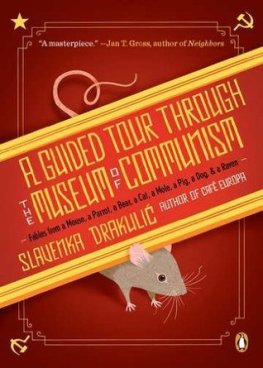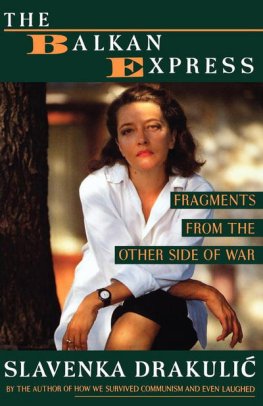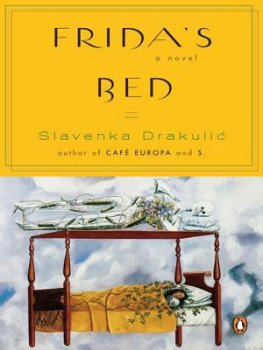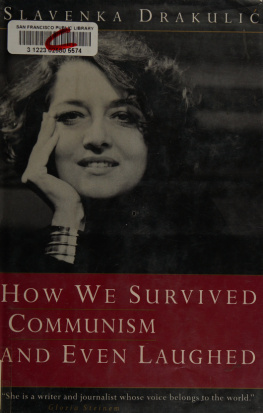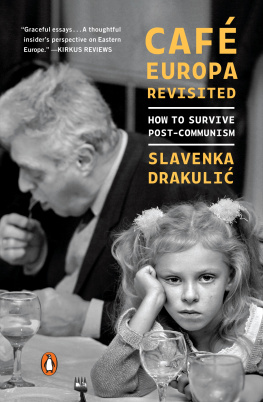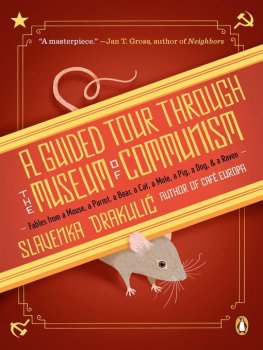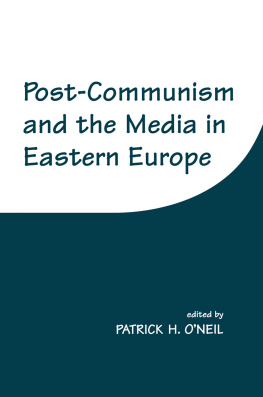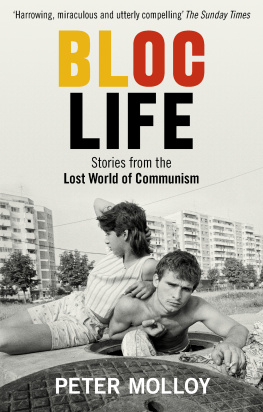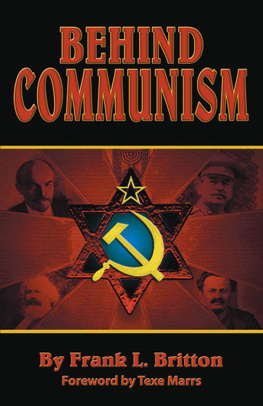Slavenka Drakulic
A Guided Tour Through the Museum of Communism
PENGUIN BOOKS. A GUIDED TOUR THROUGH THE MUSEUM OF COMMUNISM
SLAVENKA DRAKULI was born in Croatia in 1949. Her nonfiction books include How We Survived Communism and Even Laughed, a feminist critique of Communism that brought her to the attention of the public in the West; The Balkan Express: Fragments from the Other Side of War, a personal eyewitness account of the war in her homeland; Caf Europa: Life After Communism (Penguin); and They Would Never Hurt a Fly (Penguin). Drakuli is also the author of the novels Holograms of Fear, which was a bestseller in Yugoslavia and was short-listed for The Best Foreign Book Award by The Independent (UK), The Marble Skin, The Taste of a Man (Penguin), S. (Penguin), and Fridas Bed (Penguin). A writer and journalist who was published in The New York Times, The New Republic, The New York Book Review, and The Nation (where she is a contributing editor), as well as many other European magazines and newspapers, she now lives in Sweden and Croatia.
Advance Praise for A Guided Tour Through the Museum of Communism
Orwell taught us in Animal Farm that a satirical fable could introduce us to Stalinism. For our own postcommunist age, Slavenka Drakuli summons her own group of animals, each with its own literary genre, and each with a story to tell about life in a communist country. The mouse and the mole, the pig and the parrot, the raven and the bear, the cat and the dog, all seek and find ways to remind us of a time and place, and so teach us the difference between stale commemoration of the graying past and the warmth and wetness and dread and darkness of life truly and bravely recalled. This daring triumph of literary style transforms a receding epoch into the eternal present, beautifully rendering the dilemmas of life under communism as sharp instances of moral tragedy and poignant examples of the limits of self-knowledge. Literature here is an aide de memoire, not just of historical experience, but of why we choose to forget.
Timothy Snyder, author of Bloodlands: Europe Between Hitler and Stalin
Praise for Caf Europa: Life After Communism
Profound and often bitingly funny. youll never think about capitalism, modern history, or your perfect, white, American teeth in the same way again.
Elle
Insightful. Caf Europa not only helps to illuminate the political and social problems facing most of Eastern Europe, but also sheds new light on the daily life of its residents, their emotional habits, fears, and dreams. Moving and eloquent.
The New York Times
Where less sensitive observers might only bemoan the legacy of communism, Drakuli knows her people well and sees the redeeming nature of all their human frailty; for their sake, we should read her book.
San Francisco Chronicle
An important and timely book that deserves the widest possible audience.
Chicago Tribune
Praise for They Would Never Hurt a Fly
In this powerful series of reports from The Hagues international courtroom, Slavenka Drakuli confronts the Yugoslav wars grand villains and banal perpetrators as she fearlessly contemplates both the individual character of evil and the tragic, chillingly impersonal mechanisms of war. Writing with her hallmark blend of forthrightness, open-eyed irony, and psychological discernment, Drakuli gives us disturbingly intimate vignettes of war criminals who might have been her own (and our) neighbors, even as she illuminates one of our times most daunting and urgent questions: How ordinary men and women turn, and are turned, into genocidal killers. An important and a necessary book.
Eva Hoffman, author of Lost in Translation and After Such Knowledge
In the first in-depth look at the war crimes trials in The Hague, Slavenka Drakuli has written a deeply personal and lucid account. She brings to life the men who destroyed Yugoslavia mediocre people who committed extraordinary crimes.
Laura Silber, coauthor of Yugoslavia: Death of a Nation
Lucidly written. a devastating book. [Drakulis] direct, personal style does justice to the weight and grimness of these stories.
The Guardian (London)
A Guided Tour Through the Museum of Communism
In memory of my long-gone canine friends,
Poli, Kiki, and Charlie
Who controls the past controls the future.
Who controls the present controls the past.
GEORGE ORWELL
I would like to thank the Fischer Foundation in Germany for their generous grant, which enabled me to work on this book. My thanks to the IWM the Institute for Human Sciences in Vienna, and to their anonymous friend who financed my Milena Jesensk grant in 2008.
Special thanks for her help with the U.S. edition to Professor Marci Shore from Yale University, to Janos M. Kovacs from IWM for his help with the Hungarian story, to my Albanian colleague, writer Bashkim Shehu, for helping me with the story about Albania, and to Claudia Ciobanu, for her help with the Romanian story.
I am grateful to Rujana for her inspiration, to Andi for his enthusiasm and to Richard for his improvements as well as to my dear friends for their trust and support.
A SHORT NOTE TO THE READER
I am aware that, if you are not familiar with Eastern Europe under Communism, some stories from this book might appear to you highly fictitious, if not outright fantasy. Therefore, I would like to assure you that, unfortunately, this is not the case. From the point of view of persons and events described, regardless of whether a story is narrated by a dog, a cat, or some other domestic, wild, or exotic animal, it all really happened. This is easy enough to check. Indeed, as a fiction writer I often felt shamed by the imagination of politicians, of which there is ample proof in this book!
However, writing again and again about the rule of Communism and its consequences for ordinary people, I came to the conclusion that we did not have too much history, as it is often said about this part of the world. Rather, we had too much memory and too many myths. And, in my life experience, this is a dangerous combination that has often resulted in ideology and manipulation leading to conflict and terrible suffering.
I. A GUIDED TOUR THROUGH THE MUSEUM OF COMMUNISM
Come in, come in, please! Dont worry, this is only a museum of Communism, not the real thing!
I am joking. But do come in, please. You are Hans, from Wrzburg, I presume? I was expecting you. I am Bohumil, your distant relative. I live in this Prague museum in a school cabinet, among the old textbooks. It suits me. I am a bookish type, a book mouse, one could say, ha-ha! Some time ago my grammar school became a private university and the classrooms were refurbished. My cabinet was thrown out. I thought that would be the end of my comfortable life. But luckily, some people from the museum came along and brought the cabinet here, as an exhibit from the old times.
I share my days with Milena, an elderly cleaning woman who also sells souvenirs in the museum shop. She pretends that she doesnt know that I live here. But why then, I ask you, did she try to kill me with her broom the very first time she saw me, an ordinary little mouse? Well, not kill perhaps, but scare me off. As I had no other place to go, she reconciled herself to my existence. Perhaps she thought that, after all, I am an underdog just like her? Now she leaves crumbs of bread and pieces of apple and cheese near my cabinet every evening before she leaves. Often, when we are alone, she is talking to me. She calls me Bohumil! She says, You know, Bohumil, what happened to me today?and then goes on with her story. I usually stand on the windowsill and listen to her, keep her company. It took me some time to understand that since there is nobody around, Bohumil is well, me!

